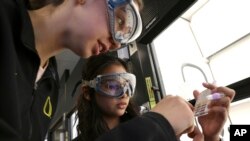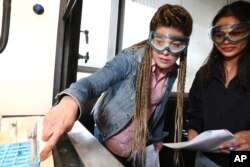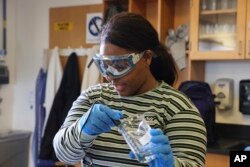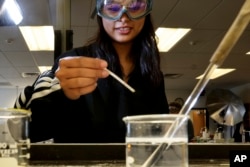Student Union
To Help Students, Some Colleges Provide Double the Teachers

Terrica Purvis squinted through goggles as her hands carefully guided a pipette full of indigo-tinted fluid into clear glass test tubes.
It was the last chemistry lab of the winter quarter at Everett Community College. Purvis was working through the steps of what chemistry professor Valerie Mosser jokingly refers to as the "post-apocalypse survival" lab — an experiment using boiled red cabbage water to test the acidity of common household chemicals.
Purvis, 27, is in her first year of study for an associate degree in nursing at Everett Community College. She is also one of more than 6,000 Washington community and technical college students enrolled in the state's Integrated Basic Education and Skills Training (I-BEST) program.
Students who need extra help in subjects such as algebra struggle to learn if the content is taught in an abstract way, educators say. So I-BEST programs feature two teachers in the classroom: One provides job training and the other teaches basic skills in reading, math or English language.
Nationally, two-year community colleges have the worst completion rates in higher education, with only slightly more than 40% earning degrees within six years.
In Washington state, students in the program graduate at a higher rate. Among students who started college from 2015 to 2018, an average of 52% enrolled in I-BEST classes earned a degree or certificate within four years. That compares with 38% of students who did so while enrolled in traditional adult basic education coursework, according to the state Board for Community and Technical Colleges.
The program is so successful that 12 states have begun implementing an I-BEST model at one or more education institutions.
For Purvis, who hadn't been in school for nearly a decade, this class meant getting extra math help when she needed it: during a chemistry class.
Each time Mosser gave a lecture or held a lab, she was joined by Candace Ronhaar, who works as a tutor and extra math instructor.
In one session, Ronhaar drew a heart on the whiteboard. She wrote the word "mole" beside it, and explained it is a unit of measurement equivalent to the amount of atoms in 12 grams of carbon-12. She guided students through practice problems, calculating the mass of chemical compounds.
All six students in Chemistry 121 were also taking an entry-level statistics class, and Ronhaar was co-instructor for both courses. Mosser said Ronhaar's presence was the most valuable part of the I-BEST model.
"I'm an assessment instructor," Mosser said. "She's just a helping instructor. In the minds of students, the difference is incalculable. They have a different relationship with her. They're more willing to go to her, because she doesn't grade them."
Purvis said chemistry was the first class that ever "humbled" her. She doesn't think she would have passed without I-BEST. Students fresh out of high school had an easier time remembering chemistry and math, Purvis said, but she hadn't studied those subjects for 10 years.
"They couldn't have picked a better second instructor," Purvis said of Ronhaar. "I loved it. We went to her office hours all the time."
After high school, Purvis spent six years as a cook in the Navy, and took classes at a couple other colleges. Last year, she was medically discharged and returned to school at Everett Community College full-time. She plans to go on to pursue a Bachelor of Science in Nursing, and hopes to work in labor and delivery at a hospital.
Helping more students graduate from nursing school has a larger societal benefit. In the first year of the pandemic, from 2020 to 2021, the number of working registered nurses in the United States decreased by more than 100,000 — the highest drop in four decades. An estimated 200,000 jobs for registered nurses are expected to open each year in the U.S. through 2031, the Bureau of Labor Statistics reported in 2021.
I-BEST was launched as a state pilot program almost 20 years ago as data suggested students needed vocational training to improve job prospects. The program was to change the remediation model in most community colleges, where students who don't do well on placement tests must take pre-college classes in their weak subject — essentially a repeat of high school.
I-BEST enrollment in the state has increased by more than 20% in the past five years, bringing in a diverse group of students. Forty-six percent of its students are students of color, 55% are women and 39% have dependents.
I-BEST opens the door to federal financial aid by making it available to students who didn't graduate from high school. Under financial aid rules, students must either have a high school diploma or prove their "ability to benefit" from aid by being enrolled in a qualifying program, such as I-BEST, where they learn basic skills as part of their career pathway.
Along with nursing, other high-demand I-BEST job pathways include aeronautics, manufacturing and information technologies.
At Bellevue College, I-BEST students enrolled in Business 101 meet with instructor Eric Nacke for an adult basic education class on a separate day. Nacke teaches English in the context of the business world.
Student Forouzan Barfibafeghi moved from Iran to the U.S. in 2020. She holds a bachelor's degree in business from Islamic Azad University in Tehran, where she graduated in 1999. She said Nacke's classes have helped her develop her English skills and given her a sense of community.
"We have created a strong bond between us. That is one of the highlights for me," said Barfibafeghi, who hopes to find work in the insurance industry after completing an associated degree in business.
In Washington, because I-BEST uses a mix of state, federal and other grant funds, the state doesn't know how much the program costs. But the model calling for two instructors does make it more expensive than other adult basic education programs. The program might be more broadly replicated if it weren't so costly, state community college spokesperson Laura McDowell said.
As Purvis prepared for her next quarter of classes, the student said she hoped her future instructors would be as helpful as Ronhaar.
"She's my favorite instructor so far since I've been going to Everett," Purvis said. "We needed her. She had to be there."
Editor's note: This story is part of Saving the College Dream, a collaboration between AL.com, The Associated Press, The Christian Science Monitor, The Dallas Morning News, The Hechinger Report, The Post and Courier in Charleston, South Carolina, and The Seattle Times, with support from the Solutions Journalism Network.
See all News Updates of the Day
- By VOA News
Competition grows for international students eyeing Yale

It’s tough to gain admission to Yale University, and it’s getting even tougher for international students as standout students from around the world set their sights on Yale.
The Yale Dale News, the campus newspaper, takes a look at the situation here.
- By VOA News
Student from Ethiopia says Whitman College culture made it easy to settle in

Ruth Chane, a computer science major from Ethiopia, writes about her experiences settling into student life at Whitman College in the U.S. state of Washington.
"The community at Whitman College made sure I felt welcomed even before I stepped foot on campus," she says.
- By VOA News
Claremont Colleges student gets a shock when she heads home to Shanghai

In The Student Life, the student newspaper for the Claremont Colleges, a consortium of five liberal art colleges and two graduate schools in Claremont, California, student Rochelle Lu writes about readjusting to her Shanghai home after spending a semester in the United States.
- By VOA News
Cedarville University aims to ease transition for international students

Cedarville University in the U.S. state of Ohio says it’s got more than 140 international students representing 44 countries.
Here, the school interviews Jonathan Sutton, director of international student services. He talks about his job and the opportunities for international students on campus.
- By VOA News
Morehouse College offers prospective students tips on applying and thriving

Morehouse College, a private, historically Black liberal arts college in the U.S. state of Georgia, offers a guide for international students interested in attending the school.
Among the tips to apply and thrive at Morehouse:
- Take advantage of the school’s orientation program
- Turn to the school’s Center for Academic Success for tutoring, support and more
- Immerse yourself in campus life via clubs and societies
- By Reuters
US reviews Columbia University contracts, grants over antisemitism allegations

The administration of President Donald Trump said on Monday it will review Columbia University's federal contracts and grants over allegations of antisemitism, which it says the educational institution has shown inaction in tackling.
Rights advocates note rising antisemitism, Islamophobia and anti-Arab bias since U.S. ally Israel's devastating military assault on Gaza began after Palestinian Hamas militants' deadly October 2023 attack.
The Justice Department said a month ago it formed a task force to fight antisemitism. The U.S. Departments of Health and Education and the General Services Administration jointly made the review announcement on Monday.
"The Federal Government's Task Force to Combat Anti-Semitism is considering Stop Work Orders for $51.4 million in contracts between Columbia University and the Federal Government," the joint statement said.
The agencies said no contracting actions had been taken yet.
"The task force will also conduct a comprehensive review of the more than $5 billion in federal grant commitments to Columbia University."
The agencies did not respond to requests for comment on whether there were similar reviews over allegations of Islamophobia and anti-Arab bias.
Columbia had no immediate comment. It previously said it made efforts to tackle antisemitism.
College protests
Trump has signed an executive order to combat antisemitism and pledged to deport non-citizen college students and others who took part in pro-Palestinian protests.
Columbia was at the center of college protests in which demonstrators demanded an end to U.S. support for Israel due to the humanitarian crisis caused by Israel's assault on Gaza. There were allegations of antisemitism and Islamophobia in protests and counter-protests.
During last summer's demonstrations around the country, classes were canceled, some university administrators resigned and student protesters were suspended and arrested.
While the intensity of protests has decreased in recent months, there were some demonstrations last week in New York after the expulsion of two students at Columbia University-affiliated Barnard College and after New York Governor Kathy Hochul ordered the removal of a Palestinian studies job listing at Hunter College.
A third student at Barnard College has since been expelled, this one related to the occupation of the Hamilton Hall building at Columbia last year.
Canada’s immigration overhaul signals global shift in student migration
From Europe to North America, nations are tightening their immigration policies. Now Canada, long seen as one of the world's most welcoming nations, has introduced sweeping changes affecting international students. The reforms highlight a growing global trend toward more restrictive immigration policies. Arzouma Kompaore reports from Calgary.
Trump administration opens antisemitism inquiries at 5 colleges, including Columbia and Berkeley

The Trump administration is opening new investigations into allegations of antisemitism at five U.S. universities including Columbia and the University of California, Berkeley, the Education Department announced Monday.
It's part of President Donald Trump's promise to take a tougher stance against campus antisemitism and deal out harsher penalties than the Biden administration, which settled a flurry of cases with universities in its final weeks. It comes the same day the Justice Department announced a new task force to root out antisemitism on college campuses.
In an order signed last week, Trump called for aggressive action to fight anti-Jewish bias on campuses, including the deportation of foreign students who have participated in pro-Palestinian protests.
Along with Columbia and Berkeley, the department is now investigating the University of Minnesota, Northwestern University and Portland State University. The cases were opened using the department's power to launch its own civil rights reviews, unlike the majority of investigations, which stem from complaints.
Messages seeking comment were left with all five universities.
A statement from the Education Department criticized colleges for tolerating antisemitism after Hamas' Oct. 7, 2023, attack on Israel and a wave of pro-Palestinian protests that followed. It also criticized the Biden administration for negotiating "toothless" resolutions that failed to hold schools accountable.
"Today, the Department is putting universities, colleges, and K-12 schools on notice: this administration will not tolerate continued institutional indifference to the wellbeing of Jewish students on American campuses," said Craig Trainor, the agency's acting assistant secretary for civil rights.
The department didn't provide details about the inquiries or how it decided which schools are being targeted. Presidents of Columbia and Northwestern were among those called to testify on Capitol Hill last year as Republicans sought accountability for allegations of antisemitism. The hearings contributed to the resignation of multiple university presidents, including Columbia's Minouche Shafik.
An October report from House Republicans accused Columbia of failing to punish pro-Palestinian students who took over a campus building, and it called Northwestern's negotiations with student protesters a "stunning capitulation."
House Republicans applauded the new investigations. Representative Tim Walberg, chair of the Education and Workforce Committee, said he was "glad that we finally have an administration who is taking action to protect Jewish students."
Trump's order also calls for a full review of antisemitism complaints filed with the Education Department since Oct. 7, 2023, including pending and resolved cases from the Biden administration. It encourages the Justice Department to take action to enforce civil rights laws.
Last week's order drew backlash from civil rights groups who said it violated First Amendment rights that protect political speech.
The new task force announced Monday includes the Justice and Education departments along with Health and Human Services.
"The Department takes seriously our responsibility to eradicate this hatred wherever it is found," said Leo Terrell, assistant attorney general for civil rights. "The Task Force to Combat Anti-Semitism is the first step in giving life to President Trump's renewed commitment to ending anti-Semitism in our schools."
- By VOA News
STEM, business top subjects for international students

The Times of India breaks down the most popular subjects for international students to study in the U.S.
STEM and business lead the pack. Read the full story here. (January 2025)
- By VOA News
Safety and visa difficulties among misconceptions about US colleges

U.S. News & World report addresses some of the misconceptions about U.S. colleges and universities, including the difficulty of getting a visa.
Read the full story here. (January 2025)
- By VOA News
Work opportunities help draw international students to US schools

US News & World Report details the three top factors in foreign students' decision to study in the U.S. They include research opportunities and the reputation of U.S. degrees. Read the full story here. (December 2024)
- By VOA News
British student talks about her culture shock in Ohio

A British student who did a year abroad at Bowling Green State University in Ohio talks about adjusting to life in America in a TikTok video, Newsweek magazine reports.
Among the biggest surprises? Portion sizes, jaywalking laws and dorm room beds.
Read the full story here. (December 2024)
- By VOA News
Harvard's Chan School tells international students what to expect

Harvard's T.H. Chan School of Public Health reaches out to international students by detailing the international student experience at the school.
Learn more about housing, life in Boston and more here.
- By Reuters
China unveils plan to build 'strong education nation' by 2035

China issued its first national action plan to build a "strong education nation" by 2035, which it said would help coordinate its education development, improve efficiencies in innovation and build a "strong country."
The plan, issued Sunday by the Communist Party's central committee and the State Council, aims to establish a "high quality education system" with accessibility and quality "among the best in the world."
The announcement was made after data on Friday showed China's population fell for a third consecutive year in 2024, with the number of deaths outpacing a slight increase in births, and experts cautioning that the downturn will worsen in the coming years.
High childcare and education costs have been a key factor for many young Chinese opting out of having children, at a time when many face uncertainty over their job prospects amid sluggish economic growth.
"By 2035, an education power will be built," the official Xinhua news agency said, adding that China would explore gradually expanding the scope of free education, increase "high-quality" undergraduate enrolment, expand postgraduate education, and raise the proportion of doctoral students.
The plan aims to promote "healthy growth and all-round development of students," making sure primary and secondary school students have at least two hours of physical activity daily, to effectively control the myopia, or nearsightedness, and obesity rates.
"Popularizing" mental health education and establishing a national student mental health monitoring and early warning system would also be implemented, it said.
It also aims to narrow the gap between urban and rural areas to improve the operating conditions of small-scale rural schools and improve the care system for children with disabilities and those belonging to agricultural migrant populations.
The plan also aims to steadily increase the supply of kindergarten places and the accessibility of preschool education.
- By VOA News
A look at financial aid options for international graduate students in US

The Open Notebook, a site focusing on educating journalists who cover science, has complied a list of U.S. graduate program financial aid information for international students.









